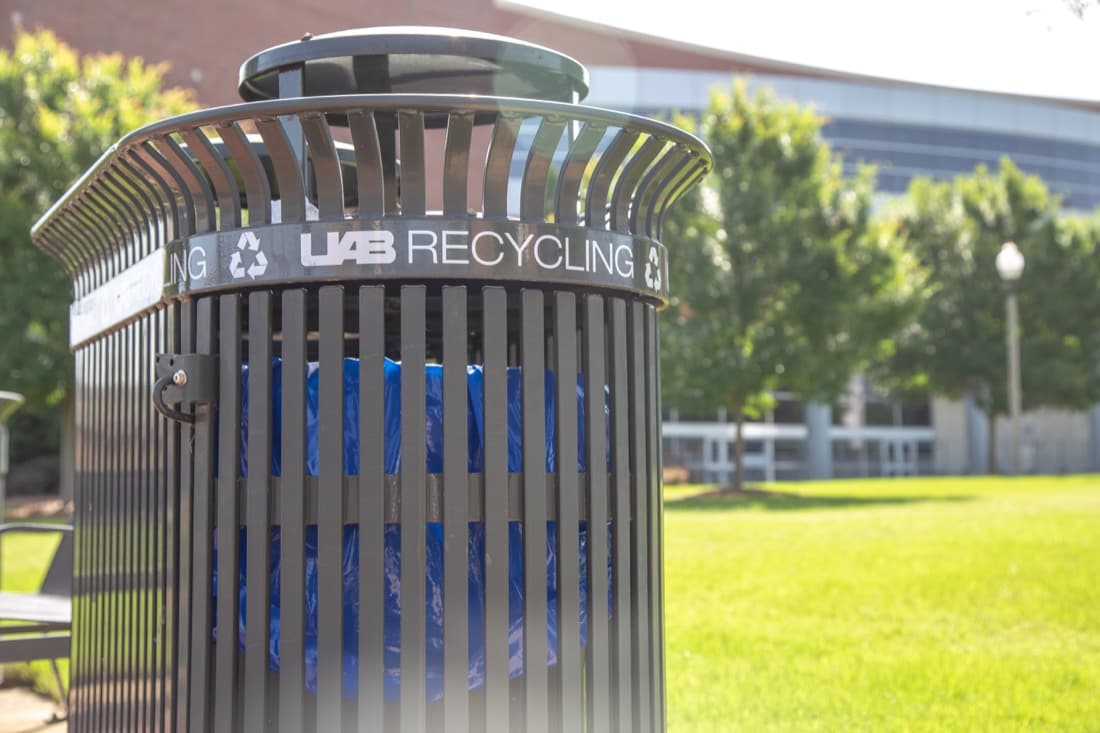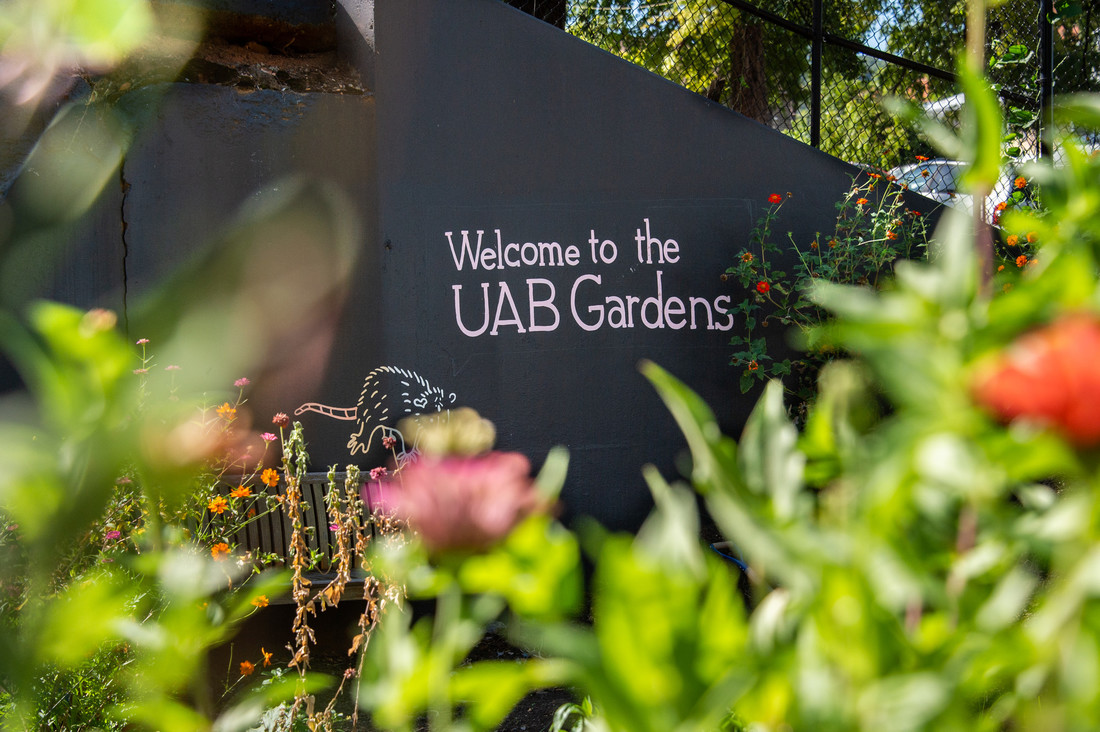-
UAB Recycling

UAB works to provide convenient recycling options to all students and staff. The UAB Recycling program’s website has comprehensive recycling information for our campus and local community.
-
The U.S. Environmental Protection Agency estimates that the transportation sector is responsible for 28 percent of greenhouse gas emissions in the nation. UAB’s Sustainability Strategic Plan for 2025 outlines goals and strategies for creating sustainable transportation solutions that mitigate emissions, traffic congestion, and parking concerns. We are actively working with UAB Transportation to achieve several of these strategies.
TRANSPORTATION GOALS AND STRATEGIES FOR 2025
Reduce employee-alone commuting from 88% to 83% and student-alone commuting from 82% to 75%Decrease vehicular traffic on campusReduce emissions from all transportation modesSTRATEGIES
- Develop an institutional telecommuting and expanded flexible workday policy to reduce commute time, improve recruitment and retention, and support work/life balance
- Conduct a biennial commuter survey
- Provide incentives for use of sustainable transportation such as public transportation, carpooling, electric vehicles, walking, and cycling to campus and on campus
- Align with UAB Campus Master Plan goals for walkability and multi-modal transportation systems
- Produce a master plan for bike facilities
- Strengthen partnerships with local transit and area transportation organizations
-
Lynne and Tim Sullivan Tree Fund
UAB’s Lynne and Tim Sullivan Tree Fund is used to maintain tree diversity, replace damaged or diseased trees, and add to the overall tree population on our urban campus.
Help us maintain and add to our lush urban campus by donating to the Lynne and Tim Sullivan Tree Fund!
Upon receipt of your gift to the Tree Fund, you or your honoree will receive a certificate by mail to recognize your support for trees at UAB.
UAB is committed to both beautifying our campus and improving the environment by investing in our campus canopy. Over the course of 50 years, a single tree can:
- Generate $31,250 worth of air pollution control
- Recycle $38,000 worth of water
- Control $31,500 worth of soil erosion
The importance of our more than 4,400 trees cannot be overstated, so we have put two key pieces of infrastructure in place to ensure the longevity of our canopy:
- UAB Campus Tree Care Plan
- UAB Tree Evaluation, Preservation and Mitigation Procedure
These plans have helped UAB earn an annual designation as an Arbor Day Foundation Tree Campus USA since 2015. UAB also received Tree Campus Healthcare recognition by the Arbor Day Foundation in 2019.
-
UAB Campus Tree Care Plan
In 2015, UAB established its Campus Tree Advisory Committee to align with the National Arbor Day Foundation’s Tree Campus USA initiative. The committee’s mission is to create a more attractive, healthy, and sustainable campus environment.
The committee developed the UAB Campus Tree Care Plan to protect, promote, and preserve existing trees on UAB’s campus, while providing guidelines to encourage the addition of campus green spaces.
About the Campus Tree Advisory Committee
The committee consists of members of the faculty, staff, and student groups, as well as a member of the Birmingham community. Each member serves a two-year term with option to renew as approved by the Chairperson – Manager, Campus Services and Grounds. The Committee conducts annual reviews of the Tree Care Plan, and provides support for projects related to trees and green spaces on campus.
-
UAB Tree Evaluation, Preservation and Mitigation Procedure
UAB created the Tree Evaluation, Preservation and Mitigation Procedure to ensure the preservation of legacy and valuable trees on campus. As part of the procedure, all trees on campus were assessed for value, based on age and location. The goals of the procedure are:
- to maintain a net zero loss of trees on campus through preservation and mitigation practices due to construction,
- to inform all parties involved in construction about the value of trees on campus,
- to protect trees from the beginning of the construction process until the completion of the project, and
- to establish procedures to ensure communication among all parties in setting expectations concerning tree protection.
The procedure requires that the assessed value of any trees removed during construction projects must be replaced, either through adding new trees to the site and/or by adding funds to the Lynne and Tim Sullivan Tree Fund.
-
Use this guide on sustainable living practices for students, designed to help you reduce your carbon footprint while promoting a healthier environment while attending UAB. Each tip is designed to be easy to implement, making your transition to a more sustainable lifestyle easier and effective.
-
Electricity
- Turn off the lights! Turn off any lights when you leave a room unoccupied.
- Use the sun: Use natural light instead of the overhead lights when possible.
- Unplug! Take inventory of devices that do not need to be plugged in all the time and place them on a power strip. Don’t forget to turn off or unplug the power strip when leaving your room unoccupied.
- Do not use gaming systems to stream shows or movies because it can use 10 to 25 times more electricity than a streaming box.
- Keep it cold: Wash clothes in cold water to help save electricity.
- Keep it closed: Keep windows/doors to the outside closed to prevent HVAC loss.
- Turn off the thermostat if windows are open.
- Set the thermostat to 74 in the summer and 68 in the winter.
-
Water
- Report water leaks using the Housing Maintenance Page
- Take shorter showers: Cutting back your shower by just one minute can save 60 gallons of water each month.
- Only flush what nature provides: Do not flush feminine hygiene products or towels down the toilet. Do not flush wipes even if they say flush-safe.
- Turn off the water when brushing teeth.
- Wash smart! Only run full loads of laundry.
-
Waste
- Refuse: Bring your reusable tote or use your backpack when purchasing items on campus to reduce how many plastic bags you use.
- Reduce: Limit single use plastic by opting for items that don’t come in plastic packaging.
- Reuse: Use a reusable water bottle. There are water refill stations all across campus.
- Recycle: Know what is and is not recyclable on campus .
- Got leftovers? Use a cutlery kit or container to hold your lunch or snacks.
-
-
UAB Green Events Guide
Reduce your Impact and help UAB reach its waste diversion goals by making your next event a zero-waste event. The Green Events Guide provides simple advice for planning a sustainable or zero-waste event. Download our Green Event Guide for a full checklist. Download our Green Event Guide for a full checklist.
-
Pre-Event
-
Designate a Green Planner
You don't need to be a green expert to plan a sustainable event. A point person can be designated to make sure you stick to the green event guidelines.
-
Go Paperless
- Promote digitally or face to face. Avoid using flyers – they contribute to paper waste.
- Work with your department's communications specialist to share event information with your audience.
- If paper is a must, select only the highest visibility locations for your flyers.
- Email any presentation, agenda, or handouts beforehand to avoid paper waste.
-
Stay Away from Plastic and Styrofoam
- Bottled water is convenient, but represents a serious environmental impact. It's best to use a beverage dispenser and ask attendees to bring their own reusable water bottles.
- If you have a lot of small events, consider investing in reusable plates, cups, and utensils and find a nearby dishwasher to take care of the cleanup.
- If you have to use disposable items, buy #1 plastic bottles or paper products that can be recycled.
-
Know Who's Coming
- How many people do you have to feed? Use RSVP systems like Facebook events, Eventbrite, or a similar service so you can prevent food waste and unnecessary cost.
- Name tags are great – their waste isn’t. Ask people to bring their UAB ID or other work ID, or use reusable name tags and collect them after the event.
- Do they have to commute to the event? Offer a telecommute option such as Zoom.
- Suggest multi-modal transportation options such as biking, public transportation, and carpooling. These options are good for your attendees’ health, and the environment.
-
Keep It Local
Part of UAB’s mission is to encourage economic growth by investing in our local business community. UAB event planners are encouraged to use local, small businesses whenever possible.
-
Think About Event Waste
- Don't let food go to waste. Encourage participants to bring their own reusable water bottles, travel coffee mugs, and reusable food containers for leftovers.
- Scope the event space to be sure there are recycling bins. If not, call the UAB Facilities Dispatch Center at 205-934-WORK (9675) to request them.
- Prioritize buffet-style food and request bulk containers for beverages, salad dressings, and condiments, as this significantly reduces waste. Choose finger food or hors d’oeuvres that are not individually wrapped.
-
Consider Eco-Friendly Merchandise
- If you are going to be giving away merchandise, consider: Will people use this or will it end up in the trash soon after the event? Is it made from recyclable or recycled materials? If the answer is “No” to both questions, you need another item.
- Choose items that convey your program’s message and also offer long-term practical uses.
- Check UAB’s approved vendor list for their green products options.
-
Designate a Green Planner
-
During Event
- Announce waste disposal procedures to the attendees at the start of the meeting, noting what can and can’t be recycled. Point out the recycling and trash bins.
- Turn off the lights! Use any natural light that your event space might have.
- Brag on yourself: Inform your guests that they are participating in a “green” event, and even point out the “green” features! This will encourage them to host a green event and be aware of ways to reduce their impact in everyday life.
-
Post Event
- Sharing is Caring: If there’s leftover food, offer to let people take it home. Ask the caterer to provide recyclable to-go containers and encourage people to use their own containers.
- Donate Food to Feed Bham: If you have enough events with food and often produce leftovers, consider establishing a relationship with a receiving organization like Magic City Harvest.
- Recycle! UAB recycles clean paper/cardboard, clean aluminum cans, and clean #1 plastic bottles. UAB Recycling has a wealth of information about what is recycled on campus.
-
-
Green Purchasing Guide
When purchasing, opting for products with recycled content or sustainable shipping materials can make a big impact!
Download our Green Purchasing Guide for easy-to-follow tips. -
Community Gardens

Located on the southside of UAB’s campus, the Community Gardens program enables UAB students, faculty, and staff to rent small plots to grow vegetables and small fruit. The space includes 44 raised beds and a mural painted by UAB art students.
How to Get Involved
If you are interested in renting a plot contact sustainability@uab.edu with your request. Once your request is granted, you may make a payment online. Plots will be assigned as requests are received and space is available. The program runs annually starting in April, with option to renew for future years.
Renters are required to sign a UAB Garden Plot Agreement. Rental fees for the year are $25 for faculty/staff and $15 for undergraduate/graduate students. An orientation for new members will be held each spring at the site, located at 1151 17th Street South, or by appointment.